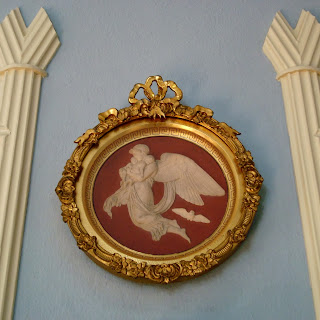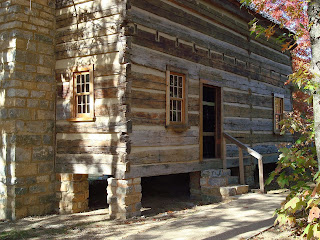Nov 1, 2008
Monte Sano Mountain | Huntsville, AL
1] Huntsville, Alabama received its first museum in 1955 when Dr. William Henry Burritt died and left his mountaintop estate to the city. Burritt on the Mountain has been referred to as a "Jewel on the Mountain."
The story surrounding the building of this green mansion is as extraordinary as the house itself. William Henry Burritt was the only son of Dr. Amatus Burritt and Mary King Robinson. Dr. Burritt came into his profession with a strong background. Both his father and grandfather were homeopathic physicians. His father had remained neutral during the Civil War and served as a mediator between the two sides when Huntsville fell into Yankee hands.
In 1892 Dr. Burritt married Pearl Budd, the daughter of a union captain stationed in Huntsville during the Civil War. The marriage was short lived. Pearl died on July 3, 1898.
The year following Pearl's death, Dr. Burritt was treating a wealthy heiress and widow, Mrs. James T. (Josephine) Drummond who was visiting Huntsville when she became ill. The wealthy widow became enamored wit her new physician and proposed to him. They were married on November 29, 1899. Her wealth allowed him to retire from the practice of medicine and devote all his attention to his new bride. Josie died in 1933 and the next year, Dr. Burritt returned to Huntsville and planned his retirement home, farm, and goat dairy. He purchased the top of Round Top Mountain and construction started in 1934.
In 1955, Dr. Burritt willed his mansion and surrounding 167 acres of land on Round-Top Mountain to the city of Huntsville.
For more info, visit: http://www.burrittonthemountain.com/
2] Monte Sano, Spanish for “Mountain of Health,” rises more than 1,600 feet above sea level. The mountain has attracted visitors since the mid 1820’s with the establishment of the town of Viduta, a derivative of the Spanish word “Vida,” meaning life. Viduta was home to a sanatorium and a hotel resort, Hotel Monte Sano, which opened its doors in 1887 and closed in the early 1900s due to a declining economy.

















































































